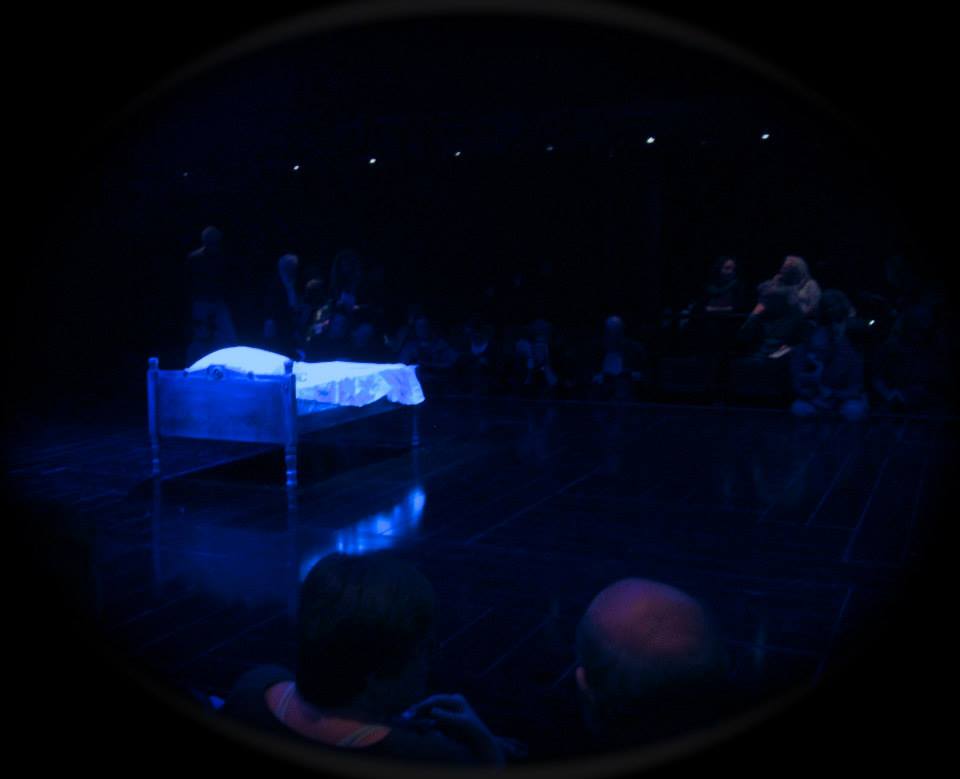Julie Taymor’s A MIDSUMMER NIGHT’S DREAM is Shakespeare in bedclothes, and sheets in particular: billowing sheets, mussed sheets, straightened and cornered sheets, sheets that wormhole through trap doors and turn into bowers and hammocks, sheets hastily wrapped around discovered lovers, sheets turned into projection screens that demarcate the horizons of the dream world.
The whole thing starts with a bed center stage, which our eyes fall upon as we admire Theatre for a New Audience’s new Polonsky Shakespeare Center, a 2013 equivalent to – not an imitation of – the Elizabethan stage, three-sided with two tiers of balconies, and groundling seats so close to the stage that the people in front might as well be on it. The voices carry splendidly; if there was any “vocal enhancement” going on, I did not discern it; the one headpiece I spotted was, I think, for some other purpose. The acting is strong and clear, physically as well as vocally, enunciating the situation as plainly as the sense of the lines; even the buffoonery of the Mechanicals, which can so easily swallow the significance of the words, is clear as glass, without losing the rough, class-tinged edges of the comedy. Some of the delivery is idiosyncratic enough to give one pause, like the almost squeal of Jake Horowitz’s Lysander and the breathy tones of Lilly Englert’s Hermia, but they were the two, she especially, of whom I was the most fond by the end.
This Midsummer adds up to something for me, as the play has not before, being, as it is, a script so overproduced as to have congealed into formula, a crowd pleaser of horseplay and misidentification, a Comedy of Errors with a dash of fairy dust. What Taymor turns it into, no, reveals it to be, is a fable, with provisos, of the maturation of love, the coming of age of the young lovers and the chastisement of the Fairy King and Queen for the childishness of their dalliances and jealousies; the love of Theseus and Hippolyta, whose marriage is celebrated at play’s end (with cake cutting and all), is the model the others aspire to or fall short of. But even that is calculated to remind us that love, or at least its expression and fulfillment, is subject to the prerogatives of power: they are, after all, a power couple, and Theseus holds in his office the power of life and death.
That we are invited by Puck in the Epilogue to regard all that we have seen as a dream does not make us forget that the tale’s impetus is Hermia’s father Egeus (Robert Langdon Lloyd) demanding of Theseus either his daughter’s subservience or her death in the matter of whom she marries. Roger Clark is brilliant, as the Athenian ruler, in conveying his disapproval of the law that, by duty, he must enforce, and slips in, twice – an afterthought lit in neon – the option of celibacy as an alternative to the death that Egeus, in his stern sexism, insists upon. The average Midsummer talks over these awkward lines, as though they were quaint remnants of an ancient tale, but Taymor does not let us forget them, not through heavy-handed polemic but by means of simple clarity. She makes sure that we hear them and cannot ignore them, and they color all that follows.
Englert’s Hermia is brave rather than infatuated, bold and fierce instead of smitten. We see from the first scene her attentiveness, the insight of her eyes when she sees that which she wants, and the fire in her body when she demands it at risk of her life. That due is ultimately granted, even if the restoration of the waking order that Shakespeare orchestrates makes us feel that, although she is reprieved, it is only because of whim, good fortune, and the dictates of classical comedy. The Fairy order, in which Titania (Tina Benko) and Oberon (David Harewood) are fantastically equal, as man and woman, is quashed by the coming of day. But that too, as Kathryn Hunter’s gnarly old Puck reminds us, is something in a dream, at least if we wish it so. The boundaries of what is dreamt or not are left splendidly fuzzy, as if we were awakened too soon, desirous, as so often happens to this sleeper, of restoring the dream to influence the end it only feigned to reach.
For more on Theatre for a New Audience, click here. For information on Taymor’s film of this production, click here.
